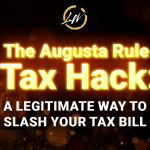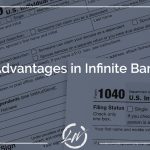In this enlightening episode, Nate Scott unveils the Augusta Rule, a powerful tax strategy that can save homeowners and business owners significant money. Discover how this legitimate tax loophole allows homeowners to rent out their properties for up to 14 days a year without paying taxes on the rental income.
Nate shares insights into how business owners can leverage the Augusta Rule to their advantage by renting their personal residences to their corporations and deducting the rental payments as legitimate business expenses.
Key Takeaways:
- Understanding the Augusta Rule: Nate introduces listeners to the Augusta Rule, a tax loophole that enables homeowners to rent out their homes for up to 14 days annually, completely tax-free.
- Leveraging the Augusta Rule for Businesses: Business owners can strategically use the Augusta Rule to their advantage by renting their personal residences to their corporations for various legitimate purposes, such as hosting meetings, staff retreats, and events. These rental payments can then be expensed by the company.
- Navigating the “Reasonable” Gray Area: Nate emphasizes the importance of defining what is “reasonable” when determining rental rates for personal residences, a critical aspect of the Augusta Rule. He shares his personal experience and underscores the need to consult with qualified accountants.
- Balancing Legitimacy and Scrutiny: Nate highlights the significance of exercising caution when employing tax strategies like the Augusta Rule. While entirely legal, these strategies may attract IRS scrutiny, making it essential to make reasonable choices.
Episode Resources:
Gain FREE access to our Beginner’s Course here now
——————————————————————————————————————————
LIVING WEALTH PODCAST
DOLLARS AND NONSENSE: EPISODE 222 TRANSCRIPTION
Nate Scott [00:03]:
I think woke liberals are likely the only people who apparently enjoy paying taxes. For the rest of us normal folks, we are all looking for ways to legally and legitimately reduce our tax bill. Each year. In this episode, we’re going to dive into one of the most legitimate tax loopholes you can find, called the Augusta rule. I’m Nate. I make sense out of money. This is Dollars and Nonsense. If you follow the herd, you will be slaughtered.
So the question for the day is, is the Augusta rule a legitimate strategy to reduce your tax bill each? So I’m going to dive into what the Augusta rule is and some of the pitfalls that I’ve seen from afar of people trying to implement this and kind of my own personal story with the Augusta rule.
Nate Scott [00:49]:
And the reality is, I think if you’ve been on social media, YouTube, whatever it is, you’ve heard of this Augusta rule more, it’s gaining a lot of steam, by the way, in a lot of social media style financial influencers. And so this is what the Augusta rule really is. It’s a perfectly legal loophole, you could say, in the tax code that allows homeowners to rent out their home for up to 14 days in a year and not pay rental income or not count it as rental income, so owe no taxes on it.
So, if you own a home, it is perfectly within the IRS code, perfectly legal, perfectly legitimate, that you can rent out your home for up to 14 days in a year and not count it as rental income. It’s kind of like the IRS saying, “hey, this is like our freebie to you, you don’t have to start being taxed as if you’re in the rental business if you’re only going to rent your home out for a couple of weeks”. And the reason why it’s called the Augusta rule is because this really took place around the Augusta golf tournament, right?
Nate Scott [01:52]:
The Augusta championships and the people in the surrounding area, they would start renting their homes just for the week of the golf tournament. They would just rent out their home for one week. And that’s why it’s called the Augusta rule. A lot of the income, because they were able to charge ridiculous prices. I mean, by the way, I remember when– I have a whole bunch of family that lives in Tulsa, Oklahoma, I actually own an Airbnb now in Tulsa, Oklahoma, which I’m going to talk about in a minute. And in Tulsa, there’s an occasionally, a PGA tour championship in Tulsa, Oklahoma. And with that being said, my grandparents own a home in Tulsa. They live in Tulsa and they were able to rent their home, which would typically rent for like $200 a night, like on a typical Airbnb style platform, something like that.
Nate Scott [02:40]:
They were able to rent out their home for like 1000, 12-15 hundred dollars a night for all the influx of people coming in to watch and attend this golf tournament. And that’s the idea of the Augusta rule, is that people were able to get large, they were able to rent their house for the week with a huge rental price per night and get all of that income tax free.
And so the Augusta rule, perfectly legitimate. Where– the angle that starts that people are actually talking about these days is the fact that most people are CPAs. And by the way, before I dive into my thoughts on it, just know I’m not an accountant, I’m not a tax professional. This is financial entertainment, this is education. Freebie by Nate, a layperson in regards to taxes.
So, where the rubber hits the road for most people is that if you own a business, whether that business is operating like Living Wealth, let’s say, in the insurance business, or whether it’s just simply like an investment business and you own real estate and you’re investing through LLCs or something like that, what the idea that most people are presenting is that your business can legally and legitimately rent your personal residence from you for up to 14 days a year, and your business can expense that rental agreement that you have between you and your business.
Nate Scott [04:04]:
And so it’s a perfectly legitimate rent expense for the company. But you personally, due to the Augusta rule, don’t have to claim that rental income as income as long as it’s only 14 days or less. And the reason why people are doing this is because they’re trying to get away with charging a high amount of rent for the houses.
So, this is where some of the pitfalls go. So, everything’s perfectly legitimate. Your business is. It is perfectly legitimate to go out and rent your home, rent your personal residence to host meetings. You can have your board meeting there, you can have staff meetings there for a day.
Nate Scott [04:44]:
You can have like a company retreat there for a day. Even if it’s just you and your spouse, you can do these types of things and it’s perfectly above board. Where things start to get gray is the fact that the rental agreement between you and the company, your business has to be reasonable. And of course, anytime in the IRS code where there is some sort of statement that something has to be reasonable, that’s the gray area that people try to take advantage of, right? There’s no question.
A reasonable– there’s a similar kind of quote unquote tax loophole, which is why many people choose to run their business out of an S corporation, elect to be taxed as an S corporation, as opposed to just like a partnership or a sole proprietorship or a C corporation. Most people choose the S corporation because, for instance, if you had a partnership or a sole proprietorship, and you’re out making money in the world, all of the income that that company makes is subject to FICA taxes, to employment taxes.
And so if you’re a business owner, you not only have to pay the employee share of FICA taxes, Social Security tax, Medicare tax, you also have to pay the employer share. So essentially, if you make $100,000 in business, you have to pay 15%, which is both sides share of that income. Just straight to FICA tax, self employment tax, essentially at that point.
Nate Scott [06:15]:
So they say, well, go ahead and elect to be an S corporation. An S corporation has to pay the owner if he’s operating the business, a salary. But anything above the profits above their salary are actually paid out without being subject to self employment tax or FICA tax. So, if somebody makes $100,000 in a year inside of their S corporation, they could choose to pay themselves a salary of whatever they want, and that would be subject to FICA tax.
But all the profit that’s made above and beyond the salary is distributed without being subject to FICA tax. But once again, just like the Augusta rule, the IRS says, well, you need to be paying yourself a reasonable salary for the work that you do. So reasonable is just not a concrete term, right? They try to justify it by saying, what would you pay somebody else to do your job in the company? What would you hire that out to do? So if I made $100,000, maybe I pay myself a $30,000 salary, and the other $70,000 is profit distributions, which are not subject to FICA taxes. But once again, the gray area is the idea of being reasonable.
Nate Scott [07:27]:
And so there’s a few tax, many of these things, like the S corporation tax status, like the Augusta rule, is always based on our own interpretations of what’s reasonable. And I remember I learned about the Augusta rule a long time ago. In fact, when I was just getting into business, I learned about the Australia rule. I learned about it back in 2014, I think. And so it’s ten years ago. Yeah, it’s 2024. It’s ten years ago. And that was the first year I implemented the August rule.
Nate Scott [07:52]:
See, this is great. I’m going to save money on taxes. I’m going to rent my house for board meetings and host a board meeting. My wife and I are on the board of my company, and we’re going to rent it for each month for twelve months of the year. Once a month, we’re going to have our board meeting here at the house. We’re going to pay $800 or $1,000 for the meeting. And we did all of that. The issue that I ran into, and I felt a little guilty.
Nate Scott [08:15]:
I mean, I’m filled with the Holy Spirit. I am a guy, by the way, who has a conscience, who also does not like paying taxes and thinks that they’re already taking way too much of my money to begin with. So I’m perfectly fine living in the gray in tax strategies. But I remember feeling like at that time, I was just getting into business. We didn’t have a nice house. It was just kind of a regular house. I was like, what exactly is reasonable? And that’s where I think some of the pitfalls of the Augusta rule take place. I felt that inside of the Augusta rule methodology that I was probably charging too much for the use of the space.
Nate Scott [08:54]:
And this is really where, no matter what happens, even though the Australia rule is completely legitimate, you really do need to speak to your accountant about how you decide to go about this and make sure your accountant is 100% on board. So, by the way, a takeaway for this, if I just mentioned this really quick is, there is absolutely no question that if you are in business and your accountant has not brought up to you the Augusta rule, you need to bring up the Augusta rule to your accountant and see what they have to say about whether or not it makes sense for you to do it and what amount makes sense and move forward with that.
But the reality is, I just felt I could probably rent my house for, at that time, like $200 a night, legitimately. And I was charging like $800 a night for this board meeting. And so this is what it all comes down to, and it’s reasonable. I know people who are charging $2,000, $2,500 a night for their home, and some of that can be legitimate. I mean, if you do have a very nice house and you are hosting a board meeting there or a retreat at your house for the company or some sort of staff event at your house, and you have a very nice house that could very well go for $2,000 to have somebody come in and do that, then absolutely go for it. I’m just merely saying this is where the pitfalls come in.
Nate Scott [10:10]:
The idea of what exactly is reasonable. If I own an Airbnb in Tulsa and that house is renting for, like, $200 a night, and my house here in Kansas, where we live outside of Kansas City, maybe I can rent for $500 a night, typically, on a platform like Airbnb. Then the question is, do I want to charge $500 a night, or do I want to try to push the limits and charge a higher amount? Because at $500 a night, that’s six grand for a year.
Like, if I was to do twelve board meetings monthly and honestly, for twelve months of the year, six grand deduction. To be able to kind of keep the paperwork, the board meetings, the board minutes, and just kind of go through it all just wasn’t really that exciting to me. By the way, we go back to 2014, I kind of decided to stop doing the Augusta rule, and I stopped doing it for a period of time just because I didn’t feel right about it. I felt like I was just gaming the system, which I’m maybe not, as opposed to now as I once was, but the real reason that it wasn’t really that I like paying taxes to the IRS. And so I decided to stop.
Nate Scott [11:16]:
Of course, it was more. It wasn’t worth it to me to have anything that I’m doing under a microscope with the IRS. And this is the idea with tax loopholes, tax strategies like this, that can kind of be pushed against, is that you are more than welcome to do all of these things that you hear on social media that your accountant tells you to do, and I say you should. If you talk to your accountant about the Augusta rule and they say it’s perfectly acceptable, here’s what I would do, and here’s how you document it, and here’s the meeting formats and so forth, do it.
And if it puts you under a microscope, that’s fine. But deep down, all of these things that are perfectly legitimate and perfectly legal, things like having your company own a vehicle, perfectly legitimate, perfectly legal, just like the Augusta rule, where it gets a bit hazy, is how much are you using this vehicle personally? How much of this vehicle use are you using for business? Can you really deduct 100% of the cost of owning that vehicle, or is it going to be personal? So, for me, what I do, and I learned this from Ray, was I purchased a vehicle in my company, and the company operates. It deducts everything around the vehicle, but I make a lease payment to my corporation for personal use. That’s what I do.
Nate Scott [12:36]:
So I just kind of threw a number out there of what I wanted to lease as a lease payment just because I know I am going to use it personally some months. Maybe it’s more for business than personal and so forth. But the idea was I’m going to pay some so that I have a legitimate thing to show the IRS. Like, yeah, I understand, I’m not using this 100% for business. I’m paying the company revenue source to use the company vehicle occasionally for personal use. And so all of this to say any tax loophole, perfectly legitimate. Go for it. But just be wise about it.
Nate Scott [13:09]:
The same thing goes with the Augusta rule. You are perfectly allowed. It is legal. It is legitimate for your corporation. If you’re in business, an actual operating business or an investment business, it’s perfectly legitimate for you to rent your home for board meetings, events, staff meetings, retreats, all sorts of things. Invite people in, have dinner, talk about the business and rent it for the day from your personal name and have the expense come from the corporation. Write that off and all the while you don’t have to claim it personally. All that’s perfectly legitimate.
Nate Scott [13:47]:
But just make sure that this whole idea of what’s reasonable is at the forefront and that is fully confirmed by your accountant. They sign off on it. They say, yes, that makes sense. That’s reasonable for a house of your size with the amenities that you have at the house.
Maybe you have a pool, maybe you have a hot tub, and it’s going to be, I don’t know, you’re just trying to jack up the price of the house and so you can get more and more tax free money out of your corporation into your own pocket and enjoy doing it. All that to say, it is a perfectly– So to sum it up, the Augusta rule, you can rent your space, your home, your personal home, to your corporation or anybody for up to 14 days and the income that you receive is tax free. Up to 14 days of rental income for the year.
Nate Scott [14:38]:
Perfectly legitimate. Your corporation can rent your home from you, expense the rent payments while you don’t actually have to claim them because you apply for the Augusta rule under 14 days of the year. Your corporation, by the way, should issue you a 1099 miscellaneous form for the rent that it pays you. So that is going to show up on your tax side. But then you have to claim the Augusta exemption, right?
You have to claim the exemption in the tax code saying that, yes, we did receive this rental income, but no, we don’t have to pay tax on it because we only rented it for twelve days of the year, not 14 days. Understand, while doing this, it might put you under a little bit of a higher likelihood. Anytime you do anything like this, it puts you under a slightly higher likelihood that you may end up getting under the microscope with the IRS. It’s possible.
Nate Scott [15:30]:
So you have to weigh that. That’s what I did back in 2014. I was like, it just wasn’t worth it to me to put anything under a microscope with the IRS. I would just rather not be bothered by them. But as you move forward, the reality is you should take advantage of anything that you possibly can. It’s a perfectly legitimate deduction. Talk to your accountant about it, and if they’re on board and you’re on board, the IRS is mostly on board, except for this idea of “reasonable” that you have to be aware of. But that’s the case with so many tax deductions, tax loopholes across the board.
Nate Scott [16:03]:
So I hope this is fun. I hope you learned something. If you had never heard of the Augusta rule, if this is the first time you ever heard of it, go ahead and send a comment to me. Ask questions about it. Whether it’s on YouTube, wherever it is you consume the content, give me a thumbs up. Like, subscribe to the content. No matter what, if this is the first you heard about it, it is time to talk to your accountant about it and see if you are a candidate for the Augusta rule. Thank you guys so much for being here.
Nate Scott [16:29]:
This has been Dollars and Nonsense. If you follow the herd, you will be slaughtered. For free transcripts and resources, please visit www.livingwealth.com/e222









